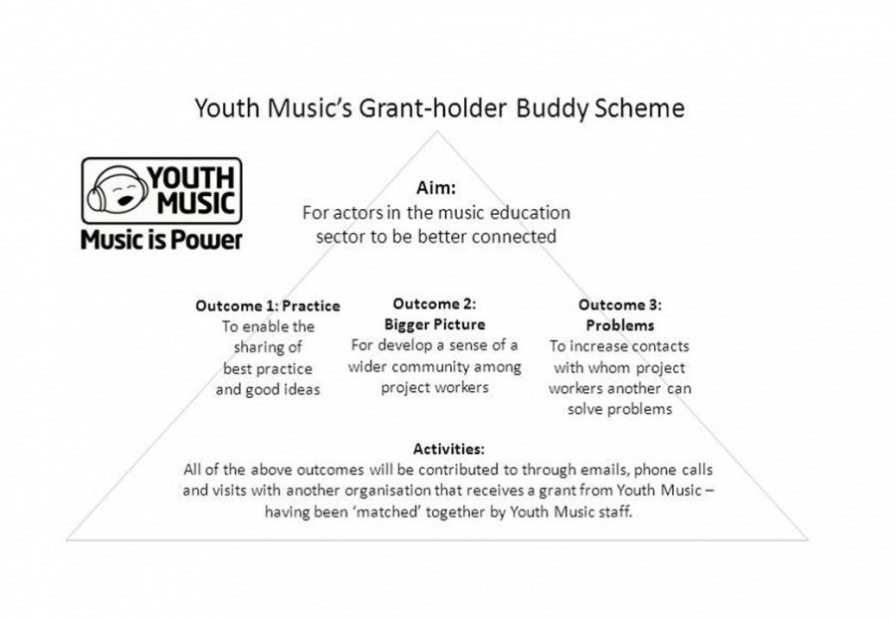Buddy, can you spare some time?

While sitting at my Youth Music desk in 2010, going about the business of responding to queries from some of the 100 Open Programme grant-holders up and down the country, it dawned on me that the project issues being faced by many of them were often falling into themes.
I found that where one project was struggling with participant recruitment -for example- that another had overcome recruitment issues with some innovative activities.
When these issues were raised with me concurrently, I took the time to introduce organisations – hoping to encourage them to share ideas and problem solve together.
This approach was rather haphazard, and by 2011 we had introduced a more comprehensive system: the Youth Music Buddy Scheme, which has continued to be a feature of the Youth Music Programme.
How does it work?
Once funding decisions are made, and we are into the process of offering funding to prospective grant-holders, we ask whether they would like to be involved in the scheme.
There is a short form to fill in (held confidentially by Youth Music, and used only for the purposes of buddying organisations), which details the areas in which your organisation could offer support to another organisation and the areas in which your organisation would like support to develop.
It is here that Youth Music’s involvement in the relationship comes to an end. Organisations continue to communicate with emails, phone calls, meetings and sometimes project visits. The relationship can be as involved or as light touch as the buddied organisations feel is appropriate.
Why do we do it?
As you might have come to expect from Youth Music, we took an outcomes approach to designing and implementing the buddy scheme. We began with the aim: For organisations in the music education sector to be better connected and arrived at the following outcomes.
• Outcome 1: Practice sharing To enable the sharing of best practice and good ideas
• Outcome 2: Bigger Picture To develop a sense of a wider community among project workers
• Outcome 3: Problem solving To increase contacts with whom project workers can solve problems
What do people say about it?
Upon being introduced to their buddy, one organisation replied:
“Thanks for this. I can see lots of parallels between what they do and what we want to achieve in terms of progression and I’m very excited about buddying up. Thanks for your work in finding such a good match; I hope we are of equal interest to them.”
Another buddy relationship is described in the Youth Music Impact Report 2011-12, with the project lead stating:
“We have been very open with each other when discussing the projects and it does not seem as if anything has been ‘off-limits’. We have talked and shared ideas about practice, funding… personal problems that we have been having on our early years projects, self-confidence and organisational support.”
And finally, from an organisation that has been involved twice through two separate grants.
“I met the first buddy for one face to face meeting. It was useful to be made aware of them and their way of working, it gave me some fresh perspectives on accreditation. The relationship has not been taken any further as, when it comes down to it, our organisations are heading in very different directions.
The second buddy has worked out slightly differently. I had been aware of them because the main contact and I sat on a regional advisory group together, but we had never taken the time to talk through how we work and where things might be shared.
After being buddied we took some time for a cup of tea and a free forming chat…
CPD for our musicians is usually bespoke and attended in-house by our entire music team, so we have offered to invite their musicians to future training days that we hold. We are also exploring the possibility of them commissioning us for some specialist work in future.
I would say the buddy scheme has opened that door. I could have rung them and tried to arrange a meeting, but because I knew we had both opted in to the scheme and had things in common, I knew I would be pushing at an open door.”
Who is taking part?
We currently have 64 organisations in buddying relationships that have been introduced as part of the Youth Music Programme (since March 2012).
The next group of approved grant-holders will also be given the chance to take part in the scheme beginning in April 2013.
We do not have capacity to offer buddying to organisations that are not successful in securing Youth Music funding – but the Youth Music Network is a great place to share ideas and make contacts.
Have you been buddied through Youth Music? What has your experience been?
